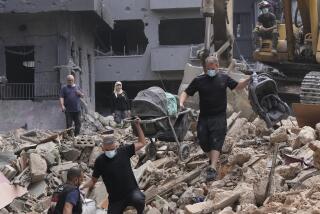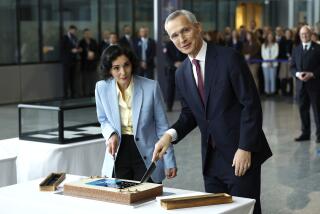Serbs Defy NATO, Continue Siege : Balkans: As air strikes loom, Gorazde’s mayor describes scenes of carnage in embattled enclave. U.N. troops caught in middle.
- Share via
SARAJEVO, Bosnia-Herzegovina — Serbian gunmen willing to take on the world, and U.N. officers loath to confront them, maneuvered ominously Friday in anticipation of NATO air strikes that threaten a colossal escalation of the Balkan war.
Despite a warning by the North Atlantic Treaty Organization of massive air attacks unless the Bosnian Serb assault on the city of Gorazde ceases immediately, nationalist rebels continued to pound artillery shells into the crowded U.N. safe area, the mayor of Gorazde reported via ham radio.
U.N. Protection Force commanders recalled a blocked convoy of 141 peacekeepers headed for besieged Gorazde, only to have their return to Sarajevo halted by rebels intent on keeping them as a potential human shield against Western bombardment.
NATO officials meeting in Brussels gave the Serbs until just after midnight tonight local time to pull back all gunmen and artillery 1.9 miles from Gorazde and to let U.N. troops and humanitarian aid through to its 65,000 desperate inhabitants.
Gorazde suffered another day of fierce bombardment as Bosnian Serb leaders engaged in fruitless peace talks in Belgrade with the top U.N. civilian in the war-torn Balkans, Yasushi Akashi of Japan.
Shelling and sniper fire killed 99 people and wounded nearly 300 in a second day of carnage among the Muslims herded into the city center and exposed to the wrath of the militant nationalist rebels. The death toll Thursday was 97.
The city’s mayor, Ismet Briga, described a scene of horror, with human corpses and animal carcasses littering streets so racked by artillery fire and gunfire that harried medics could not retrieve the victims.
Four aid workers with the U.N. Office of the High Commissioner for Refugees trapped in Gorazde reported intense bombardment of vital facilities filled with desperate civilians displaced earlier in the 3-week-old siege.
“The hospital has been hit several times again,” said the Sarajevo spokesman for the refugee agency, Kris Janowski. “The area is shrouded in smoke.”
The U.N. airlift of food and vital supplies to Sarajevo resumed Friday after a 12-day suspension after token air strikes April 10-11. Some relief officials speculated, however, that the move was more an effort to stock up supplies for an expected escalation of the conflict than an indication that the security concerns have abated.
Janowski said he hoped that the Serbs comply with the NATO ultimatum, warning: “Otherwise, we’re facing a humanitarian disaster which we will be talking about for a long time. What has happened is bad enough, but it could get worse if the indiscriminate shelling continues.”
Serbian rebels see Gorazde as a vital part of the rogue republic they have carved out of Bosnia because it is at the junction of two important roadways and the Drina River.
It is also one of only three surviving Muslim pockets in eastern Bosnia, which has otherwise been conquered and subjected to the Serbs’ brutal policy of “ethnic cleansing.”
In Belgrade, the Yugoslav capital, Akashi met with Serbian President Slobodan Milosevic, his Bosnian proxy, Radovan Karadzic, and the Bosnian Serb military chief, Gen. Ratko Mladic. No progress toward restarting peace talks was reported from the session conducted while the Bosnian Serb rebels carried out their bombardment.
House-to-house fighting was reported in Gorazde as Serbian infantry moved to within a few blocks of the city’s main square, the mayor reported in an emotional exchange with Sarajevo officials via ham radio.
“We have only two choices: We can be slaughtered, or we can fight and die with dignity,” Briga said. “The town will not fall as long as there is anybody alive in it.”
The courage to hold out against the storm of Serbian artillery and tank fire appeared inspired by the expectation that NATO warplanes may soon come to their rescue.
While the prospect of Western intervention kindled hope among the anguished people of Gorazde, U.N. officials at mission headquarters feared that the peacekeeping force is about to be sucked into full-scale war without the necessary troops, equipment or mandate.
“We know we haven’t got an army that works,” said one U.N. officer concerned that the 15,000-strong contingent deployed to assist humanitarian aid operations is unsuitable for conducting the ground activities needed in conjunction with air strikes.
“Quite apart from the (differing) regiments and the nationalities, we don’t have the equipment. The heaviest kit we’ve got are 11 Leopard tanks up in Tuzla,” the European officer said of the peacekeeping force made up of troops from dozens of countries.
“We’re not here for war. This is the problem,” the exasperated officer said.
“There’s an immense feeling of frustration, because we felt so close a few weeks ago to getting somewhere,” he said, referring to a NATO ultimatum that stopped the shelling of Sarajevo and to the reunion of Bosnian Croats and Muslims. “Suddenly we’re in a situation where it’s all blown up in our faces. It’s like being a beaten semifinalist. It’s awful.”
Another officer at the U.N. command post here warned that stepping up air strikes would effectively put the impartial peacekeeping force on the side of the outgunned Bosnian government forces.
If new air raids fail to force the Serbs to desist and return to negotiations, the U.N. mission would be unable to continue its operations in support of delivering humanitarian aid, he said.
“If things went badly wrong, we would all scuttle back to the federation and put together a new force and a new mandate,” the officer said, speaking of a possible retreat by the U.N. mission to territory held by the reunited Bosnian Croat and government forces.
Sarajevo, the current headquarters, is surrounded by Serbian forces.
Foreign diplomats and relief workers, however, seem united in the view that peaceful options for resolving the Bosnian crisis have been exhausted, especially in the Gorazde enclave, where at least 535 civilians have been killed and 1,740 wounded in the latest offensive.
The Bosnian government praised the NATO decision to halt the killing in Gorazde. Prime Minister Haris Silajdzic expressed gratitude to President Clinton, whom he credited with pushing the NATO alliance to finally confront the rebels who have conquered at least 72% of this country since taking up arms against its proclaimed independence in March, 1992.
More to Read
Sign up for Essential California
The most important California stories and recommendations in your inbox every morning.
You may occasionally receive promotional content from the Los Angeles Times.














